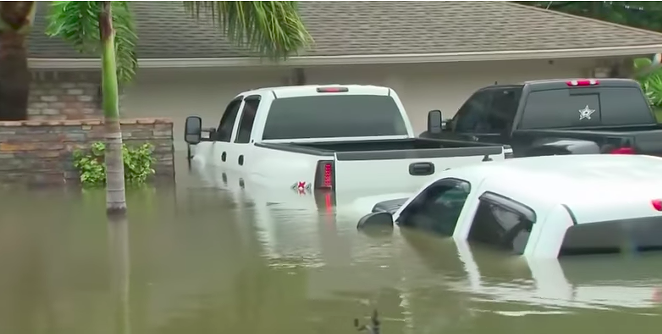In Dickinson, Texas, where nearly 8,000 homes and 88 businesses were damaged by the floodwaters of Hurricane Harvey, residents seeking city funding to help rebuild must adhere to one rule: Don't boycott Israel.
It's arguably the last concern on the mind of South Texas victims struggling to piece their waterlogged life together. But don't blame Dickinson — this wildly irrelevant stipulation is straight from the Texas Legislature, which passed a bill last session prohibiting state governments from entering into contract with an individual unless they promise they "will not boycott Israel during the term of the contract.”
But what does "boycotting Israel" look like in South Texas, some 7,000 miles from Jerusalem? Unless you're actively searching for Israeli-made products to purchase online, it's easy for someone in Texas to appear like they are "boycotting" Israel.
And so what if they are?
People who have chosen to boycott Israeli-made products liken Israel's treatment of Palestine and its Arab minority to South African apartheid — a system dismantled, in part, by a massive boycott of South African-made goods in the 1980s.
According to civil rights attorneys, banning Texans from participating in a boycott like this is a clear violation of American liberties.
“The First Amendment protects Americans’ right to boycott, and the government cannot condition hurricane relief or any other public benefit on a commitment to refrain from protected political expression,” said Andre Segura, the legal director of ACLU of Texas, in a press release. “Dickinson’s requirement is ... reminiscent of McCarthy-era loyalty oaths requiring Americans to disavow membership in the Communist party and other forms of ‘subversive’ activity.”
The Supreme Court's on the ACLU's side. In 1982, the court ruled that boycotts are a protected form of free association and free expression, an idea the country was essentially founded on.
According to Texas Governor Greg Abbott, any anti-Israel decision is anti-Texan, since Texas is "Israel's number one trading partner" in the United States. Remember when Texas Agricultural Commissioner Sid Miller took a ceremonial vacay to Israel and taught Israelis how to lasso on Palestinian territory? Texas cares a lot about keeping that friendship in place — while mildly ignoring Palestine's existence (no, not Palestine, TX). And San Antonio's fully on board.
Friday morning, Mayor Ron Nirenberg and District 1 Councilman Roberto Treviño jetted off on a "trade mission" to Israel with plans to "deepen relationships with local leaders, align economic development opportunities in targeted industries." There is no mention of visiting Palestine on the trip.
Meanwhile, in Texas, politics has become part of the hurricane recovery process. It's still unknown if this seemingly irrelevant pledge in support of Israel will deter any residents from applying for funds.
"A lot of people are actually still homeless, families are still in temporary shelters,” said Ayesha Khan, a Houstonian supporter of Palestinian rights, in an interview with the Intercept. “I think, if anything, this just prolongs the time for homes to be back in refurbishing and how long families take to go back home.”


